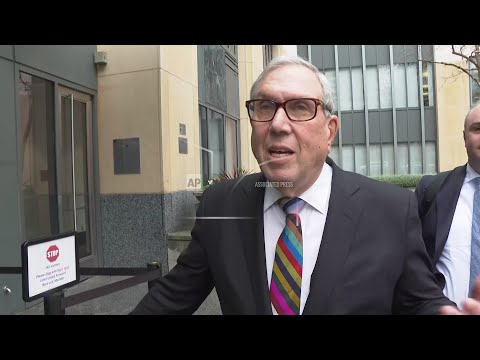(7 Apr 2025)
RESTRICTION SUMMARY:
ASSOCIATED PRESS
Oakland, California – 7 April 2025
1. Exterior of the Oakland Courthouse
2. SOUNDBITE (English) Jeffrey Kessler, attorney:
"So this is a landmark settlement in the history of the NCAA. It will be one of the largest antitrust damage settlements in history, 2.75 billion dollars to be distributed to the athletes. And it’s going to create the first revenue sharing system in the NCAA so that athletes actually can receive some of the tremendous revenues that they generate for these schools. It’s going to eliminate all restrictions on the number of scholarships athletes could get, and it’s going to change a lot of lives. So we’re very excited about this settlement, and we’re very hopeful and optimistic that it will be approved today."
3. Kessler entering courthouse with his team
4. SOUNDBITE (English) Steve Berman, attorney:
"Historically, the NCAA has favored men over women in terms of contracts and revenue generation. And so, yes, that’s the way the backward settlement is allocated, because we have to follow historical patterns."
5. Exterior of the Oakland Courthouse
6. SOUNDBITE (English) Steve Berman, attorney:
"I am optimistic the judge already gave the approval of the settlement, and there’s nothing new that has come up in the objections that she hadn’t already seen."
7. Exterior of the Oakland Courthouse
8. SOUNDBITE (English) Steve Berman, attorney:
"College sports have gotten more popular than ever. They’re setting revenue and ticket sales records, even though some of the athletes are getting paid millions of dollars. So I think it’s going to continue to flourish."
9. Exterior of the Oakland Courthouse
10. SOUNDBITE (English) Steve Berman, attorney:
"As long as the high school athlete, as a parent or agent or guardian to protect their interest, I don’t see why they shouldn’t be able to monetize like anyone else is able to monetize their skills."
11. Berman entering the courthouse
STORYLINE:
The final hearing for a landmark $2.8 billion settlement that will impact every corner of college athletics opened Monday with several athletes criticizing the sprawling plan for undervaluing them and leading to widespread confusion on whether to opt-in or risk being left behind.
U.S. District Judge Claudia Wilken already has granted preliminary approval of the settlement involving the NCAA and the nation’s five largest conferences and she gave no indication early during the hearing that anything has changed her mind. The changes would begin July 1, clearing the way for each school to share up to $20.5 million each with their athletes, but her final decision is not expected until later this month.
Outside of the Oakland Courthouse on Monday attorneys Jeffrey Kessler and Steve Berman said they were "optimistic" the judge would approve the settlement.
The settlement hashed out last year by attorneys representing the defendants and those representing thousands of current and former athletes has its share of critics. Smaller schools say it will leave them behind deep-pocketed, donor-heavy programs and even the proposed guidelines are not expected to calm the huge spending now common across college sports.
The settlement also calls for replacing scholarship limits with roster limits. The effect would be to allow every athlete to be eligible for a scholarship while cutting the number of spots available. There will be winners and losers under such a formula, though some fear it could signal the end of the walk-on athlete in college sports and also imperil smaller sports programs that feed the U.S. Olympic teams.
Find out more about AP Archive: http://www.aparchive.com/HowWeWork
Twitter: https://twitter.com/AP_Archive
Facebook: https://www.facebook.com/APArchives
Instagram: https://www.instagram.com/APNews/
You can license this story through AP Archive: http://www.aparchive.com/metadata/youtube/21af888bce974a2186655bb33a998108
Author: AP Archive
Go to Source
News post in April 13, 2025, 12:00 am.
Visit Our Sponsor’s:
News Post In – News





